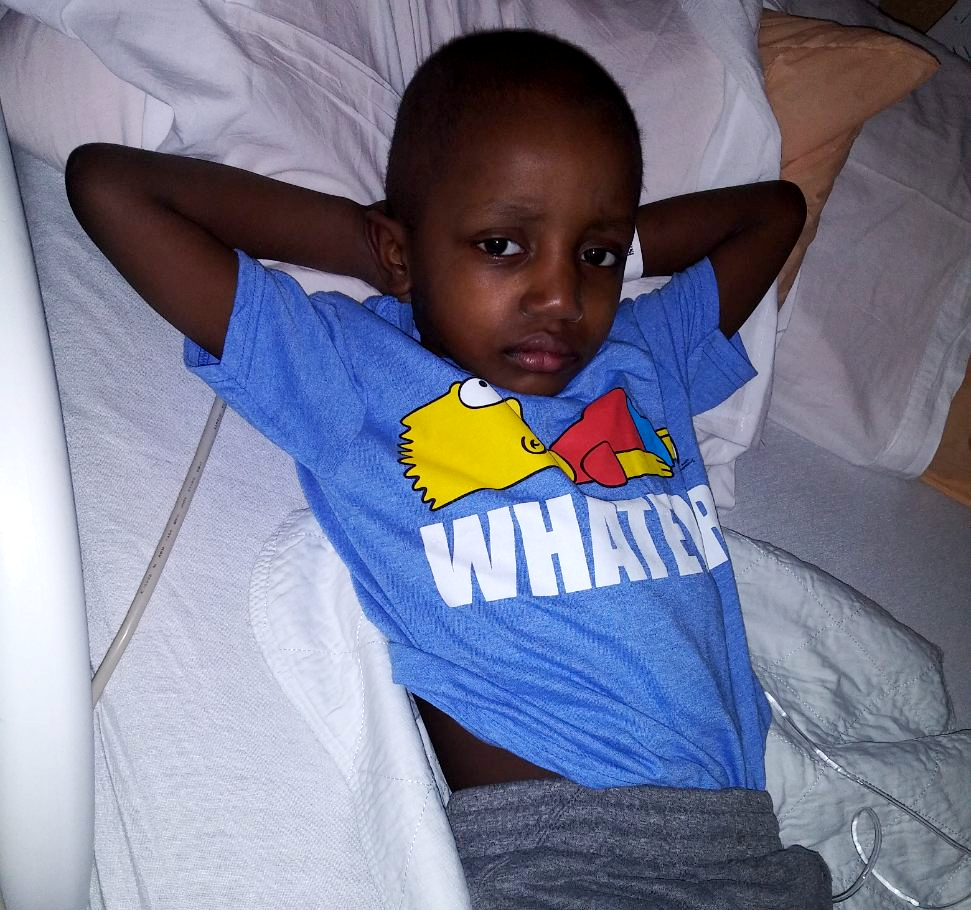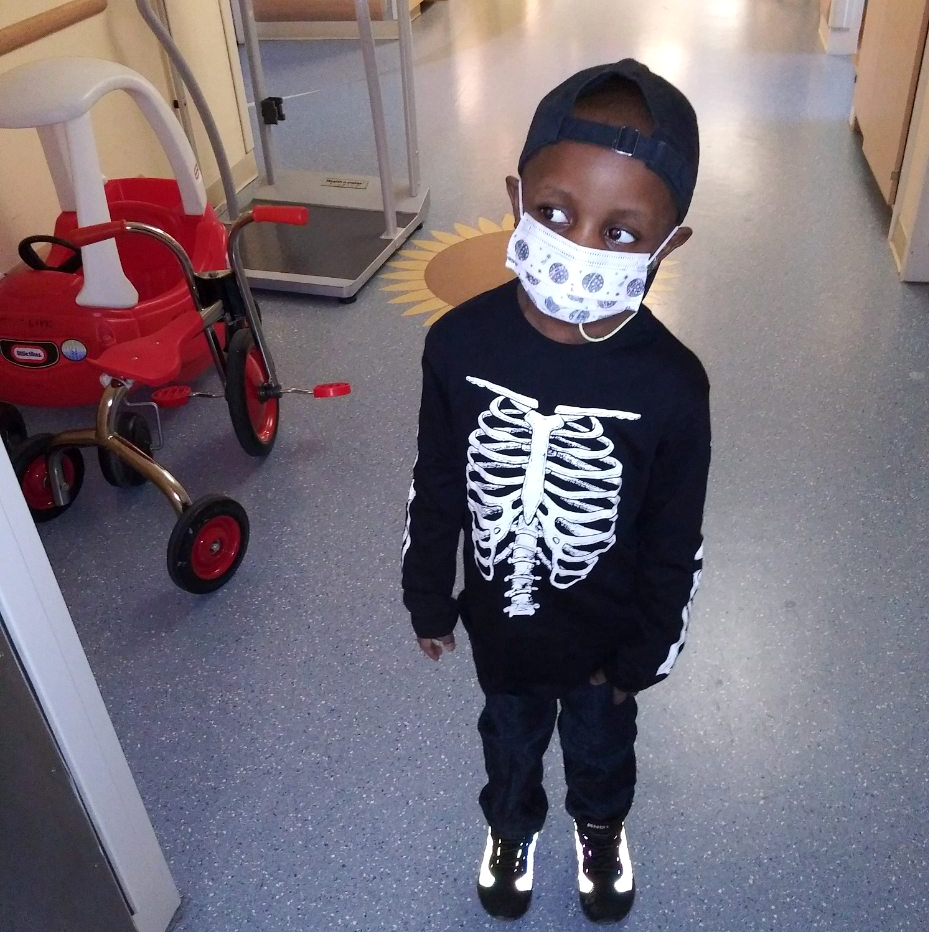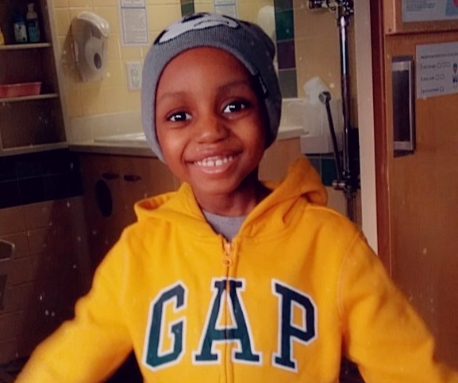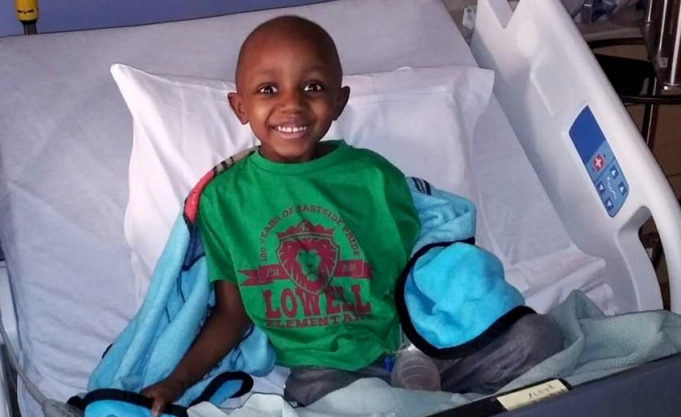It was a month into quarantine when La Toya Jackson’s then 3-year-old son, Pharaoh, complained about his leg hurting. Pharaoh had often complained about his leg before, so Jackson, 39, didn’t think anything of it. She thought with time he would feel better again, as he had in the past.
Except this time, his pain only worsened.
“He kept crying about it, which he never did,” Jackson said. “Then he couldn’t walk. To even go to the bathroom, someone would carry him or he would crawl.”
Jackson took him to the clinic on April 18 where they did a few X-rays before Jackson was told to go to the emergency room. There, a CT scan was completed and then all Jackson and Pharaoh could do was wait until the results came in. And they did, with a new discovery.
“They came back and was like, ‘it looks like cancer,’” Jackson said. “I was like ‘what? No, you’re wrong, his leg hurts. How is it cancer?”
Over the next two days, doctors ran biopsies, scans and X-rays on Pharaoh to determine what was happening. On April 20, Pharaoh was diagnosed with stage 4 neuroblastoma, a cancer of the nervous system.
“It was like someone knocked the wind out of me,” Jackson said tearfully in a phone interview. “I couldn’t breathe, I couldn’t hear anyone. They were talking but I couldn’t hear anything after they said cancer. It was kind of like ‘this is a dream right? They didn’t just tell me my 3-year-old son has cancer, it’s not possible.’ It was unbelievable, I still to this day think I’m gonna wake up and realize it’s a dream.”
Neuroblastoma
Neuroblastoma, a pediatric tumor, typically arises in the adrenal gland, right above the kidney. The tumor is usually found in children younger than one year old, whereas in Pharaoh’s case, the tumor was found two weeks before he turned 4. Immediately after his diagnosis, Pharaoh was hospitalized for 10 days. Since then, he’s been in and out of the American Family Children’s Hospital, where he’s being treated.
Pharaoh has had five rounds of chemotherapy, a round of radiation therapy, and a resection surgery for his tumor. That surgery left him in the hospital for five weeks. Most recently, Pharaoh was in treatment for a transplant.

Most days Pharaoh sleeps, does physical therapy, speech therapy, school work or hangs out with his mom.
“He’s really lethargic right now,” Jackson said. “But other times there’s a lot of hanging out and bonding and everything.”
Pharaoh’s care
At the start of quarantine, Jackson, who had been working as a youth worker at the Goodman Community Center, was furloughed due to COVID-19. Even if she were to get her job back, she now can’t work since she takes care of Pharaoh, the youngest of her four children.
“I can’t go back because of his hospital stays and his care,” she said. “I have no one to take care of him, and I can’t send him to daycare or school because his immune system is really compromised right now.”
Still, Jackson had to find a way to pay for hospital bills. That is why Jackson’s longtime friend and neighbor, Chelsea Mikkelson, worked with her and Jackson’s community to create a GoFundMe for Jackson.
“It’s heartbreaking,” Mikkelson said. “I feel like it’s every mother’s worst nightmare. Adding COVID to the mix just makes it 10 times worse. My first response, as well as numerous other people, was to help her out. Lots of people have helped, [including] staff and parents at Lowell — that’s where her kids went to elementary school — staff at Goodman Community Center, her coworkers, numerous neighbors, her friends, her family and then all the people who’ve never even met La Toya but heard her story and reached out to help via GoFundMe.”
The GoFundMe has raised almost $20,000 since it started in April.
“I don’t know, as a mother, to be thinking of her alone in the hospital, we can’t come visit her and hug her. Just, it’s been horrible. And it’s 10 times worse for her,” Mikkelson said.
With COVID-19, hospitals have limited visitation, which for the most part has not negatively impacted Jackson.
“Sometimes you just don’t want to be around people because it’s just so much,” she said. “I can use this as an excuse and people understand.”
However, with limited visitations, Jackson’s other family members and children, ages 18, 12 and 11, can’t visit him in the hospital.
“The older one can since he’s 18, but he works outside and comes in contact with too many people,” she said. “For the younger ones, they have to wait until he comes home to see him.”
Limited visitation and social distancing are a few changes cancer patients experienced throughout the pandemic at American Family Children’s Hospital, said Dr. Ken DeSantes, head of the Division of Pediatric Hematology, Oncology and Bone Marrow Transplant and one of the doctors treating Pharaoh.
Usually for cancer patients, every morning a large team of doctors, nurses and pharmacists would go room to room, talk to parents and discuss the plan of care for the day. These “bedside rounds” moved to a virtual setting for a while but now they’ve returned to in-person rounds, but outside the room.
“We think we can do it safely,” Dr. DeSantes said, “because these were things that just had to happen. You couldn’t delay a child’s chemotherapy because of the pandemic, it would place the child at risk of their cancer progressing. If you needed to do a CT scan to see how they responded, you needed the information to continue to care for the child and decide whether the current treatment needed to change gears and do something differently. So those kinds of things continued despite the pandemic.”
Dr. DeSantes started working with Pharaoh after his diagnosis was made. He was involved with the radiation therapy Pharaoh underwent and has been on his team of doctors since. With the three ways kids can present with neuroblastoma, Pharaoh presented with a high risk disease.
“About half of the kids present with high-risk disease, like Pharaoh did, and those patients usually have a widely metastatic disease,” he said. “So the disease often spreads to the bone marrow, and it spreads to multiple bones. Those are the most common sites of metastasis for this disease. So patients become very sick, typically, when they present to the hospital. Because of this widespread tumor, it’s all over their body so there’s often lost weight, they’re feeling lethargic and fatigued, they may not want to walk anymore because of leg pain, because of bone involvement. They’re pretty miserable when they present because they’re feeling very ill.”

If Pharaoh were to contract the novel coronavirus, the likelihood of it affecting him too much is low, Dr. DeSantes said.
“Those antibodies are now available for some patients, but you have to be at least 12 years old to get those drugs, so he’s not old enough for that,” he said. “So we [would] monitor him closely for any problems. There’s been a lot of data already collected on pediatric oncology patients who have gotten COVID. There have been a few deaths, but the vast majority of patients seem to do quite well, despite having cancer. So, the chances are that if he did contract COVID, the probability is he’d still do well, because most pediatric oncology patients have done well.”
Home life
For Jackson, the diagnosis and subsequent treatment have changed her home and family life. When she is with Pharoah, she sterilizes everything he comes in contact with and has to keep up with his medication schedule.
“At first I was even scared to touch him because he had a Hickman line coming out of his chest,” she said.
Since she’s with him all day, she can’t be with her other children. When Pharaoh was first diagnosed and admitted, Jackson had to quickly rush home to get clothes and necessities. She had to tell her children what happened quickly before rushing out.

“It was hard coming home and telling your kids that their little brother has cancer,” she said. “I came home to grab some clothes but I had to drop this big bomb on them. I didn’t even have the chance to process this with them. They worry about him a lot.”
Pharaoh has been responding well to his treatments, Jackson added.
“He has really good doctors, they have a really good plan and he’s responding to everything great,” she said. “He’s a lovable kid, everybody loves him.”
“I’ve worked with the family and I know Pharaoh pretty well,” Dr. DeSantes said. “He’s just a great little boy. Just a tremendous, high spirited boy with a great attitude. [It’s been] a pleasure to take care of him and the family is also absolutely delightful to work with.”
Ultimately, as Pharaoh continues his treatment plan, which is a minimum of 18 months, Jackson hopes to spread awareness on how underfunded childhood cancer research is.
“[This] can happen to anybody, you never know,” she said. “Also, childhood cancer research is really underfunded. I learned that only four percent of [federal] money goes to childhood cancer research. Some of the things that they use on kids are used on adults and it’s working, so they could put more money into researching. Kids need this type of stuff.”










